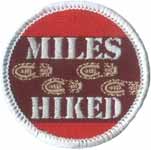Why did your son want to join Scouting? He wanted to do out-of-doors stuff - hike, camp, and explore nature. Plus, "A Scout Is Fit!"
To that end, Pack 501 has a “Hiking Club”. The goal will be to get out and hike as often as possible between all of the Pack's other activities or included as part the planned activities, all year round.
On a his first hike, the Scout earns a “Miles Hiked” patch. This patch can be worn on his swag vest or in the temporary patch placement area of his uniform.
After that, miles are tracked, and the Scout earns “segments” for each 10 miles that he hikes.






By the time they finish Webelos most of the Scouts who start in the beginning ranks will have more than 100 miles! A determined Scout will likely cross-over to Boy Scouts with more than 200 miles!
While the pack encourages families to hike as often as they can, recognition and mile-tracking will only include pack-sponsored hikes.
GETTING STARTED
Hiking Coordinator & Team: One of our parents acts the Pack “Hiking Coordinator”. This team schedules the hikes and tracks miles.
Hike lengths will typically range 1 – 5 miles. Tigers should have no problem with shorter hikes. We just ensure that the parent-guardian brings plenty of water along, and a few snacks (for both of them).
On longer hikes we will typically eat lunch on the trail (practicing “Leave No Trace” at all times). Scouts will carry water bottles and may use day packs (or their parent-guardian acts as the beast of burden). On warmer weather hikes, a small water bottle is not enough for even the smallest Scout.
During winter, prior to departure, we will need to double-check the dress of the Scouts (particularly newer Scouts) to ensure they are properly prepared. If not, we will need to wait for them to go and pick up the forgotten, hat, gloves, mittens, coat, boots, etc.
On all hikes, an adult leader will be assigned to the “tail” position. No one is allowed behind this individual. The Pack hikes as a unit. We start together, break together, etc., with everyone following the same trail. We may allow an older Scout to “Lead”. We will usually work in map reading with them, where we have a route we want to take on the map. It’s up to the Scout to sort out the forks, etc., in the trail. However, they will have their parent-guardian with them also. We will also introduce the Scouts to geocaching, which involves using a GPS to locate hidden caches in the woods whenever possible.
Benefits:
1) Very outdoor-oriented (It's why boys joined scouts in the first place!).
2) Helps ready Scout for Boy Scouts. By their Webelos year, they are very comfortable in outdoor situations.
3) Recruitment. The hiking stick is a very positive incentive for new Scouts.
4) Increases participation in the Pack. Scouts look forward to earning patches.
5) A Scout is Fit! Boys need more time getting exercise and less time playing video games or watching TV.
6) Easy to reinforce buddy system along trail, walks to outhouse, etc.
7) Numerous opportunities to draw in Scouting requirements and lessons.